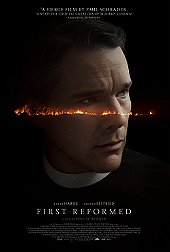Paul Schrader’s work is obsessed with men in perpetual crisis, frequently punctuated by acts of great violence. Rarely is the aura of his work so muted as it is in First Reformed, a late-career masterpiece from the purveyor of toxic masculinity in self-destruct mode. Think of the explosions of violence and impotent rage viewed in Taxi Driver, Raging Bull, or Affliction, then turn around and give First Reformed another look. All the hallmarks are there, but a quiet maturity has taken hold.
This makes sense as Schrader’s camera has turned itself towards a crisis of faith, of spirituality, morality, purpose and an ever-present sense of guilt encroaching behind its main character’s eyes. There’s a lot going on behind the placid surfaces of Ethan Hawke’s reverend, and Schrader’s camera is obsessed with catching all the flickering thoughts and repressed emotions as they slowly leak out. It all culminates, as it often does in Schrader’s work, with a scene of violence and (possible) redemption.
Yes, this film is something of a summary of Schrader’s body of work, be it as screenwriter or director. It’s undeniably bleak and stark an affair. This is a world where one character’s suicide is something of spiritual rebirth for the holy man. While he may not literally bath in the blood of the lamb here, there’s enough symbolizes and juxtaposition of images, music, and ideas placed next to each other to underscore this point. A votary must have a flock in crisis in order to do the good deeds and works involved in that vocation, and this inciting incident gives him a renewed sense of purpose.
It just doesn’t this emphasis on violence and self-destruction causing growth, but the witnessing of one man’s inner turmoil that slowly burbles until it explodes. Much like Taxi Driver, there’s the prevalence of a journal and extensive voiceover where we’re placed inside the fracturing and jaundiced worldview of our main character as his corrosive anger makes him more of a loner and radical figure. Hawke’s character eventually adopting the same radical environmentalist methods and vestments of the dead man feels like the logical outgrowth of this emotional trajectory.
The symbolism is often heavy here, with a malfunctioning church organ reflecting the complicated relationship Hawke has with women and sex. Or in the way that Hawke’s been regulated to stewarding an old Dutch Reformed Church that’s mainly a starkly white tourist attraction and not a lively place of worship. He’s a man adrift with shaky relationships to the wider world and his own religious ideology, and here is he shepherding a largely empty house that’s been forsaken for one of those ghastly megachurches that practically spits in the face of true spiritual fulfillment and doctrine. Hawke’s reverend is the church and the church is him.
Into this near antiseptic world, one that makes hell look like parts of THX 1138 merged with Calvinism, comes a young couple expecting a child. The wife, Mary (Amanda Seyfried, did anyone see her being the breakout of Mean Girls?), is devout and looking for guidance in something from her childhood, and her husband, Michael (Philip Ettinger), a nonbeliever and the sacrificial lamb that will lead to the major reawakening and blasphemous feelings.
Michael and the reverend are something of twinning images of each other as they both feel tremendous guilt pressing down on them and conflicted feelings about progeny. Hawke’s character lost a son after pressuring him into joining the military in the wake of the Iraq War, while Michael looks upon his wife’s pregnancy with terror given the current state of the world. Life and death, both environmental and fleshy varieties, become conjoined and blur together in their separate mindsets but in their communications with each other.
When I wrote about The Wife, I made mention of cinema’s obsession with pointing a camera at an actor’s face and watching what happens as they express two different things at the same time. First Reformed is the male equivalent as it sticks its camera in front of Hawke’s face and watches him go. It’s amazing how slowly he burns and how repressed he plays so much of the film. His final scene where he debates wearing a suicide vest and forces himself to remove it only to tie barbed wire around his body is a knockout punch. Never has self-flagellation or an obsession with misery looked like the product of such deep introspection and clear-eyed resolve.
First Reformed is a glimpse of religious man going into the darkness and emerging with an Old Testament-like fury and mentality. It’s fascinating and absorbing, alternately hideous and beautiful, sacred and profane. Hallelujah.
 Login
Login